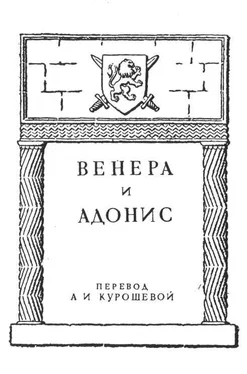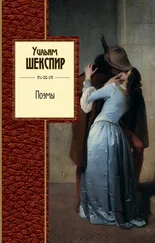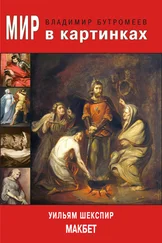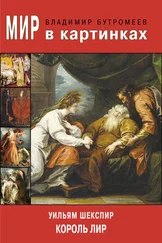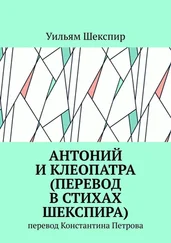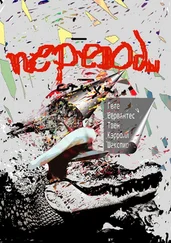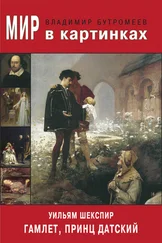Look, how the world's poor people are amaz'd
At apparitions, signs, and prodigies,
Whereon with fearful eyes they long have gaz'd,
Infusing them with dreadful prophecies;
So she at these sad sighs draws up her breath,
And, sighing it again, exclaims on Death.
'Hard-favour'd tyrant, ugly, meagre, lean,
Hateful divorce of love,' — thus chides she Death, —
'Grim-grinning ghost, earth's worm, what dost thou mean
To stifle beauty and to steal his breath,
Who when he liv'd, his breath and beauty set
Gloss on the rose, smell to the violet?
'If he be dead, О no! it cannot be,
Seeing his beauty, thou shouldst strike at it;
О yes! it may; thou hast no eyes to see,
But hatefully at random dost thou hit.
Thy mark is feeble age, but thy false dart
Mistakes that aim and cleaves an infant's heart.
'Hadst thou but bid beware, then he had spoke,
And, hearing him, thy power had lost his power.
The Destinies will curse thee for this stroke;
They bid thee crop a weed, thou pluck'st a flower.
Love's golden arrow at him should have fled,
And not Death's ebon dart, to strike him dead.
'Dost thou drink tears, that thou provok'st such weeping?
What may a heavy groan advantage thee?
Why hast thou cast into eternal sleeping
Those eyes that taught all other eyes to see?
Now Nature cares not for thy mortal vigour,
Since her best work is ruin'd with thy rigour.'
Here overcome, as one full of despair,
She vail'd her eyelids, who, like sluices, stopp'd
The crystal tide that from her two cheeks fair
In the sweet channel of her bosom dropp'd;
But through the flood-gates breaks the silver rain,
And with his strong course opens them again.
O! how her eyes and tears did lend and borrow;
Her eyes seen in the tears, tears in her eye;
Both crystals, where they view'd each other's sorrow,
Sorrow that friendly sighs sought still to dry,
But like a stormy day, now wind, now rain,
Sighs dry her cheeks, tears make them wet again.
Variable passions throng her constant woe,
As striving who should best become her grief;
All entertain'd, each passion labours so,
That every present sorrow seemeth chief,
But none is best; then join they all together,
Like many clouds consulting for foul weather.
By this, far off she hears some huntsman holla;
A nurse's song ne'er pleas'd her babe so well:
The dire imagination she did follow
This sound of hope doth labour to expel;
For now reviving joy bids her rejoice,
And flatters her it is Adonis' voice.
Whereat her tears began to turn their tide,
Being prison'd in her eye, like pearls in glass;
Yet sometimes falls an orient drop beside,
Which her cheek melts, as scorning it should pass,
To wash the foul face of the sluttish ground,
Who is but drunken when she seemeth drown'd.
О hard-believing love! how strange it seems
Not to believe, and yet too credulous;
Thy weal and woe are both of them extremes;
Despair and hope make thee ridiculous:
The one doth flatter thee in thoughts unlikely,
In likely thoughts the other kills thee quickly.
Now she unweaves the web that she hath wrought,
Adonis lives, and Death is not to blame;
It was not she that call'd him all to naught,
Now she adds honours to his hateful name;
She clepes him king of graves, and grave for kings,
Imperious supreme of all mortal things.
'No, no,' quoth she, 'sweet Death, I did but jest;
Yet pardon me, I felt a kind of fear
Whenas I met the boar, that bloody beast,
Which knows no pity, but is still severe;
Then, gentle shadow, — truth I must confess, —
I rail'd on thee, fearing my love's decease.
"Tis not my fault: the boar provok'd my tongue;
Be wreak'd on him, invisible commander;
'Tis he, foul creature, that hath done thee wrong;
I did but act, he 's author of my slander:
Grief hath two tongues: and never woman yet,
Could rule them both without ten women's wit."
Thus hoping that Adonis is alive,
Her rash suspect she doth extenuate;
And that his beauty may the better thrive,
With Death she humbly doth insinuate;
Tells him of trophies, statues, tombs; and stories
His victories, his triumphs, and his glories.
'О Jove!' quoth she, 'how much a fool was I,
To be of such a weak and silly mind
To wail his death who lives and must not die
Till mutual overthrow of mortal kind;
For he being dead, with him is beauty slain,
And, beauty dead, black chaos comes again.
'Fie, fie, fond love! thou art so full of fear
As one with treasure laden, hemm'd with thieves;
Trifles, unwitnessed with eye or ear,
Thy coward heart with false bethinking grieves.'
Even at this word she hears a merry horn
Whereat she leaps that was but late forlorn.
As falcon to the lure, away she flies;
The grass stoops not, she treads on it so light;
And in her haste unfortunately spies
The foul boar's conquest on her fair delight;
Which seen, her eyes, as murder'd with the view,
Like stars asham'd of day, themselves withdrew:
Or, as the snail, whose tender horns being hit,
Shrinks backwards in his shelly cave with pain,
And there, all smother'd up, in shade doth sit,
Long after fearing to creep forth again;
So, at his bloody view, her eyes are fled
Into the deep dark cabins of her head:
Where they resign their office and their light
To the disposing of her troubled brain;
Who bids them still consort with ugly night.
And never wound the heart with looks again;
Who, like a king perplexed in his throne,
By their suggestion gives a deadly groan,
Whereat each tributary subject quakes;
As when the wind, imprison'd in the ground,
Struggling for passage, earth's foundation shakes,
Which with cold terror doth men's minds confound.
This mutiny each part doth so surprise
That from their dark beds once more leap her eyes;
And, being open'd, threw unwilling light
Upon the wide wound that the boar had trench'd
In his soft flank; whose wonted lily white
With purple tears, that his wound wept, was drench'd:
No flower was nigh, no grass, herb, leaf, or weed,
But stole his blood and seem'd with him to bleed.
This solemn sympathy poor Venus noteth,
Over one shoulder doth she hang her head,
Dumbly she passions, franticly she doteth;
She thinks he could not die, he is not dead:
Her voice is stopp'd, her joints forget to bow,
Her eyes are mad that they have wept till now.
Upon his hurt she looks so steadfastly,
That her sight dazzling makes the wound seem three;
And then she reprehends her mangling eye,
That makes more gashes where no breach should be:
His face seems twain, each several limb is doubled;
For oft the eye mistakes, the brain being troubled.
'My tongue cannot express my grief for one,
And yet,' quoth she, 'behold two Adons dead!
My sighs are blown away, my salt tears gone,
Mine eyes are turn'd to fire, my heart to lead:
Heavy heart's lead, melt at mine eyes' red fire!
So shall I die by drops of hot desire.
Читать дальше
